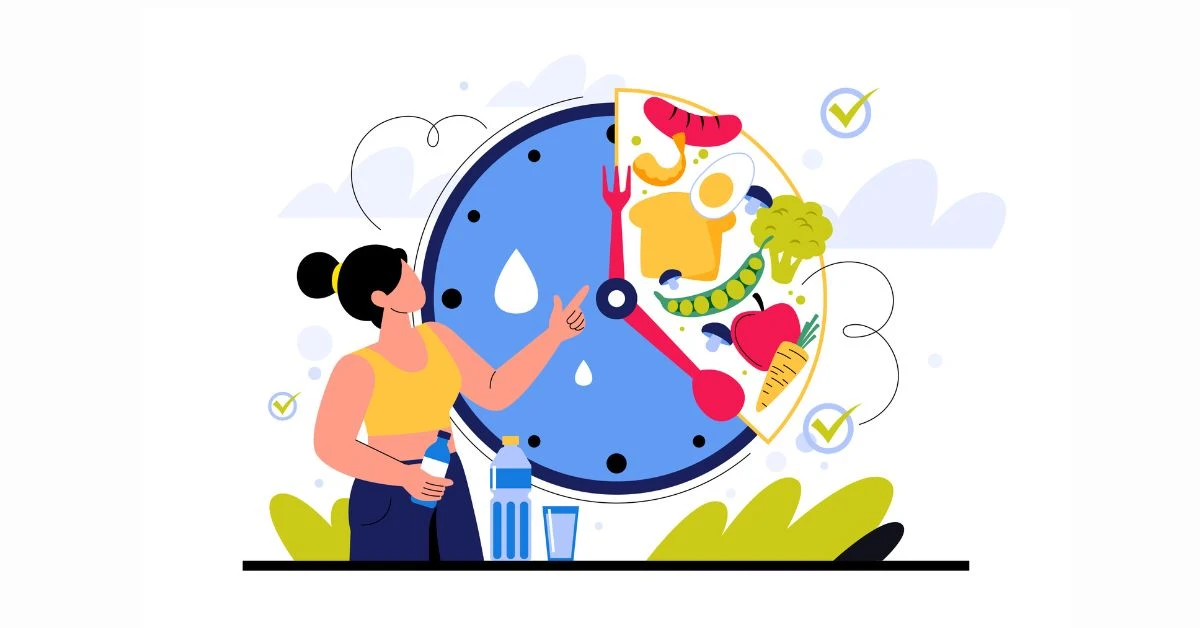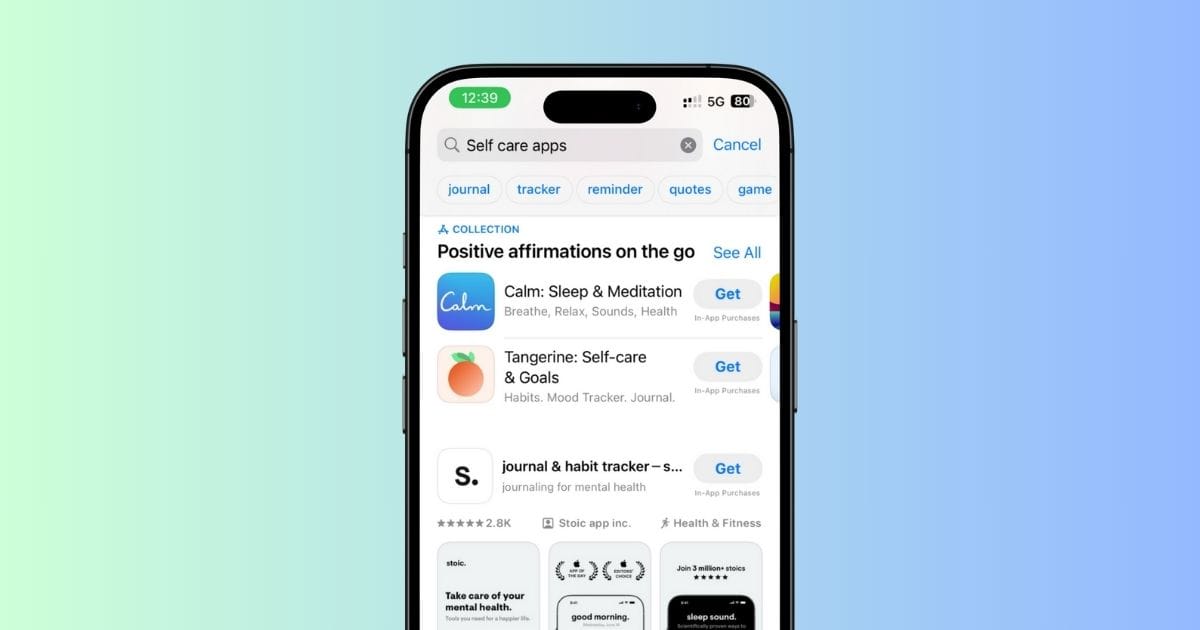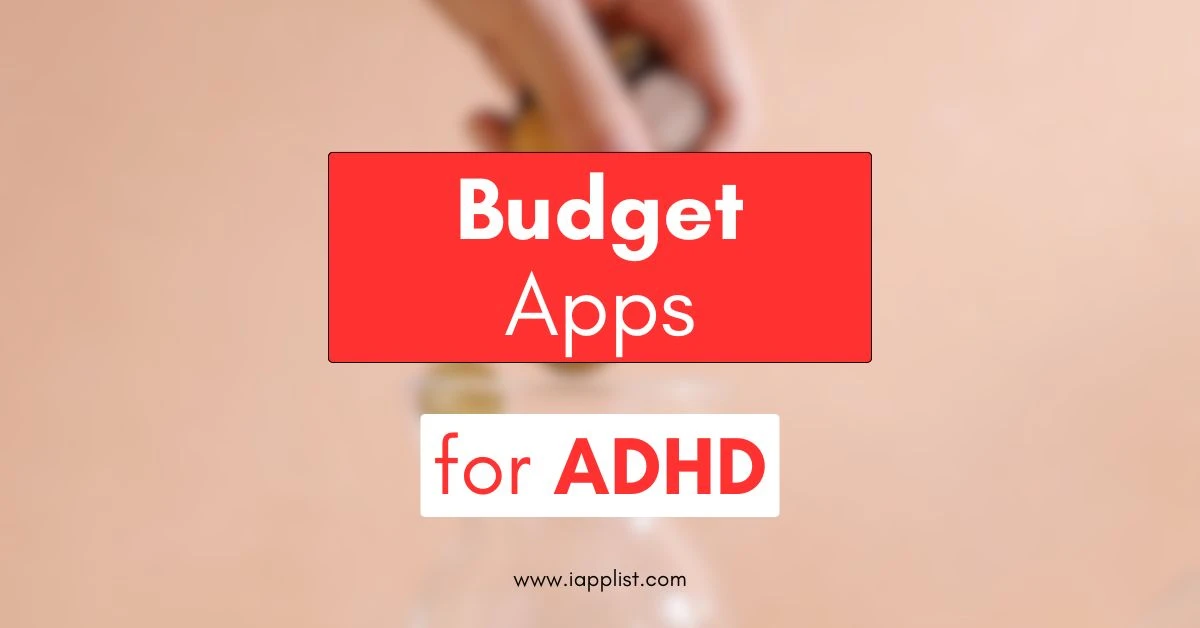10 Best Meditation Apps to Calm Your Mind
Life can get so overwhelming sometimes, right? Work, family, your never-ending to-do list… it all piles up.
And honestly, sometimes you just need a break. Something simple to help you breathe, clear your head, and actually relax for once.
That’s exactly why I wanted to share this list of my favorite meditation apps with you.
I know there are tons of them out there—it’s hard to even know where to start. But these apps are the ones people actually use.
The ones that help you fall asleep, calm your mind, and even learn to meditate if you’ve never tried it before.
I’m keeping it simple here, no fluff. Just the best options I’d tell my own friends about.
If you’ve been thinking about giving meditation a shot (or want to find a better app than the one you tried last year), I really think you’ll find something that clicks here.
Let’s check them out.
1. Calm – Best for Sleep and Relaxation
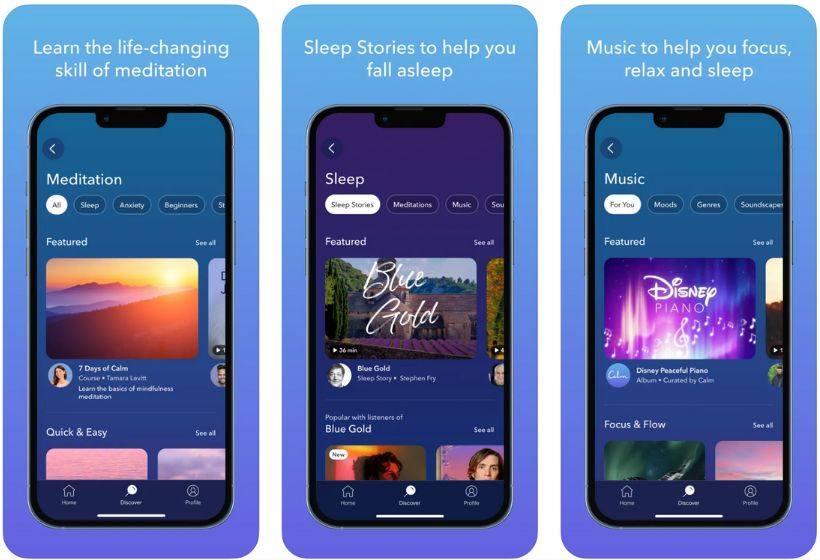
Pros:
- Huge library of Sleep Stories, music, soundscapes
- Great for beginners and experienced meditators
- Beautiful, calming design
- Works on multiple devices
Cons:
- Free version is limited
- Subscription can be pricey
Get it from: App Store | Google Play | Website
Calm is hands-down one of the most popular meditation apps out there—and for good reason.
If you’re someone who struggles to fall asleep, Calm’s Sleep Stories alone are worth trying. They’re basically bedtime stories for adults, read in soothing voices (think Matthew McConaughey or Idris Elba, seriously).
But Calm isn’t just for sleep—it has daily guided meditations, breathing exercises, calming music, and even gentle stretching routines to help you unwind after a long day.
What I really like is how polished and easy it is to use.
You can pick something quick for 5 minutes if you’re short on time, or settle in for a 30-minute wind-down at night. It’s also perfect if you just want relaxing sounds or music while you work or study.
Honestly, if you want an app that does it all—sleep help, stress relief, relaxation, and even daily mindfulness practice—Calm is one of the best places to start.
It’s simple, soothing, and designed to help you actually relax when life feels too much.
Also read: Best self care apps
2. Headspace – Best for Structured, Science-Based Learning
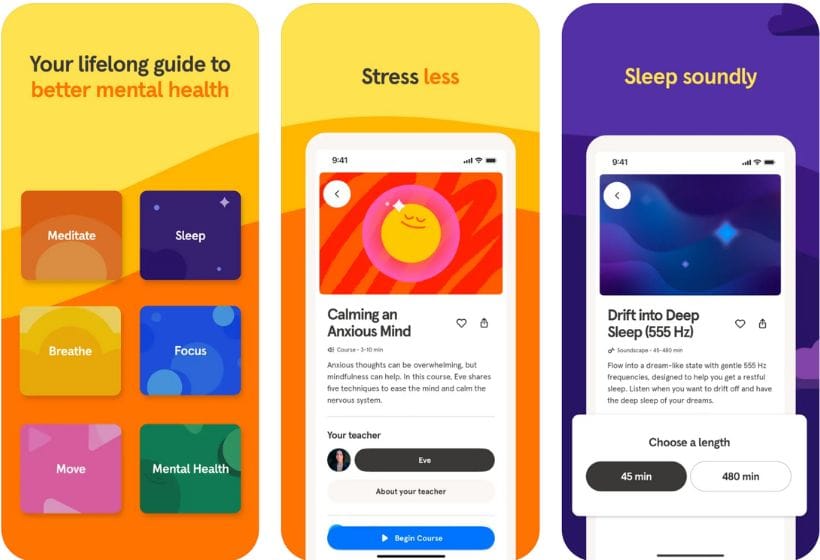
Pros:
- Very beginner-friendly with clear guidance
- Structured courses for different goals
- Fun, approachable style
- Backed by science
Cons:
- Free content is limited
- Subscription needed for full access
Get it from: App Store | Google Play | Website
Headspace is one of those apps you hear about everywhere, and honestly, it deserves it.
It’s perfect if you’re new to meditation or want a step-by-step way to build a real mindfulness habit.
Instead of just dropping you into random meditations, Headspace actually teaches you how to meditate. You get structured courses on stress, sleep, focus, anxiety—basically anything you’re dealing with.
It also has these short “bite-sized” sessions for when you’re busy. Even 1–3 minute meditations, if that’s all you have time for.
And the vibe? It’s friendly and casual.
A lot of people love Headspace because it’s rooted in science. The app often references studies and proven techniques.
It feels intentional, not just someone telling you to “breathe” without explaining why.
If you want to really learn meditation and make it part of your daily life, Headspace is one of the best places to start. It’s clear, approachable, and actually kind of fun.
Also Read: Best Anxiety Apps
3. Insight Timer – Best Free Library of Guided Meditations
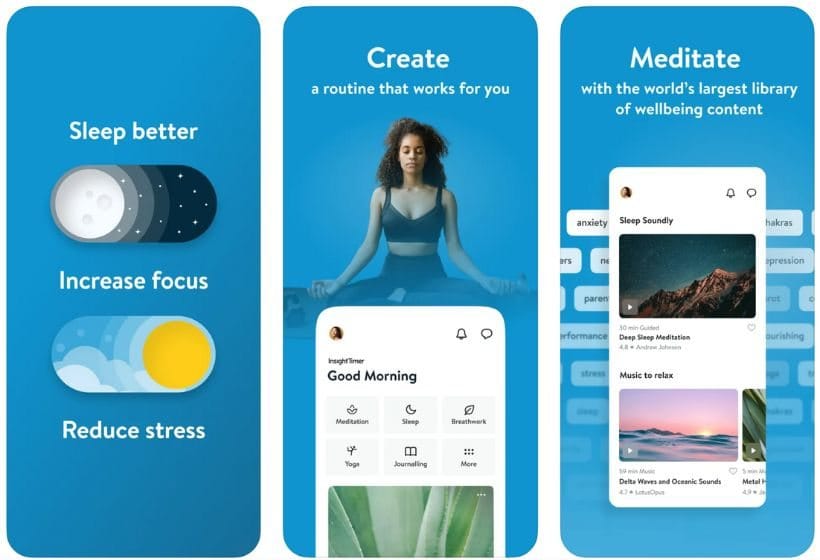
Pros:
- Huge library (230,000+ free sessions)
- Great variety of teachers and styles
- Community features for connection
- Lots of free content
Cons:
- Can feel overwhelming with so many options
- Some premium features locked behind subscription
Get it from: App Store | Google Play | Website
If you want options, Insight Timer is the one.
Seriously—it has one of the biggest collections of free guided meditations you’ll find anywhere. We’re talking over 230,000 free sessions.
Whether you want help sleeping, calming anxiety, focusing, or even learning mindfulness for kids, there’s something here.
It’s not just quantity, either. The variety is amazing.
You’ll find famous teachers, spiritual guides, psychologists, and even musicians creating content. You can choose guided sessions, relaxing music, ambient soundscapes, or just set a meditation timer with gentle bells.
One of my favorite things is the community vibe.
You can see who’s meditating at the same time, join groups, and even take live classes. It feels more connected, less isolated.
If there’s any downside, it’s that the sheer amount of content can feel like too much at first.
But if you’re willing to explore, it’s a goldmine—especially if you want something free. It’s one of the best ways to dive into meditation without spending a dime.
4. Breethe – Best for Beginners with Step-by-Step Programs
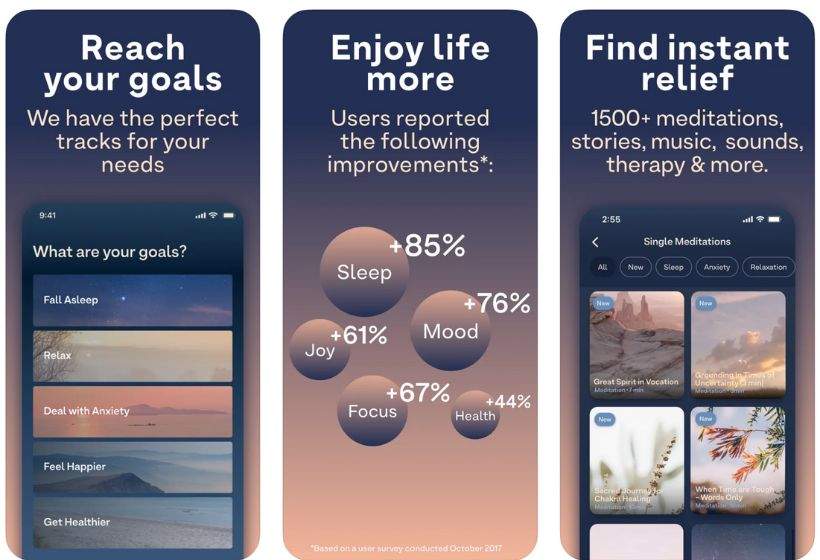
Pros:
- Easy-to-follow, structured daily plans
- Includes sleep help, hypnotherapy, coaching
- Soothing, user-friendly design
- Lots of content for different needs
Cons:
- Subscription required for most features
- Interface can feel busy for some
Get it from: App Store | Google Play | Website
Breethe is perfect if you want someone to hold your hand through learning meditation.
It doesn’t just drop you into random sessions—it actually guides you with step-by-step daily programs, making it great for beginners who want structure.
What’s cool about Breethe is that it isn’t just meditation. It has sleep stories, music playlists for relaxation, even hypnotherapy sessions, and life coaching talks.
So if you want one app that covers everything from winding down at night to getting motivated in the morning, it’s all there.
The app design feels calm and welcoming, with a friendly voice that explains what to do and why.
It also tailors suggestions based on your goals, like stress relief, better sleep, or building a morning routine.
Sure, most of the good stuff is behind a subscription, but many users say it’s worth it for the sheer variety and quality of content.
If you’re looking for an all-in-one mindfulness app that really guides you from start to finish, Breethe is one of the best choices out there.
Also read: Best wellness apps
5. Happier – Best for Personalized Monthly Plans
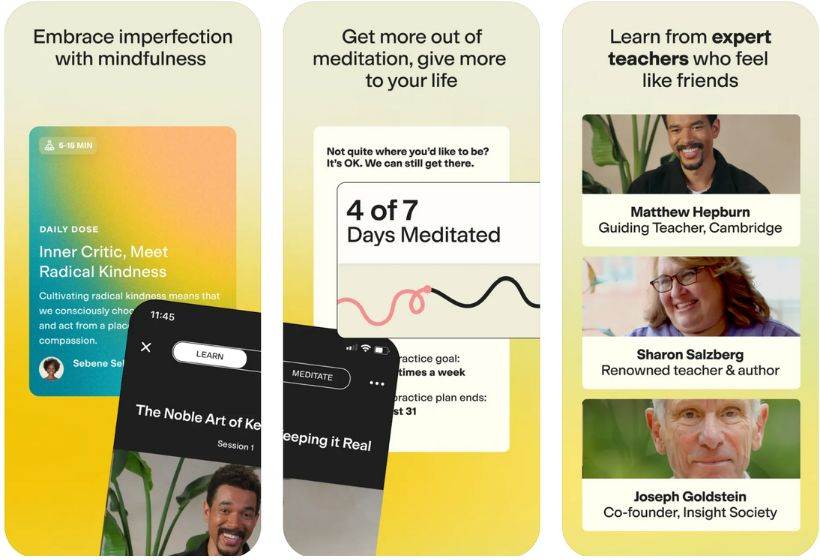
Pros:
- Personalized meditation plans with monthly check-ins
- Over 500 guided meditations
- Simple, clean design
- Focused on real-life stress relief
Cons:
- Subscription needed for full access
- Smaller sleep library than some competitors
Get it from: App Store | Google Play | Website
Formerly known as Ten Percent Happier, the app officially rebranded to Happier in late 2024, and the new name really fits.
It’s all about helping you feel a little bit better each day, in a realistic and approachable way.
What sets Happier apart is its personalized approach.
You don’t just pick a random meditation; the app actually checks in with you monthly to see how you’re doing and adapts your plan.
Whether you’re dealing with work stress, anxiety, or just want to build a daily habit, it adjusts to your needs.
Happier has over 500 guided sessions from respected teachers and meditation experts.
It also includes short, flexible sessions (as little as 5 minutes) so you can fit mindfulness into any schedule. The app design is super clean and calming, making it easy to find exactly what you need.
If you’re looking for a meditation app that feels like it knows you and evolves with you, Happier is a really solid pick.
6. Simple Habit – Best for Quick 5-Minute Sessions
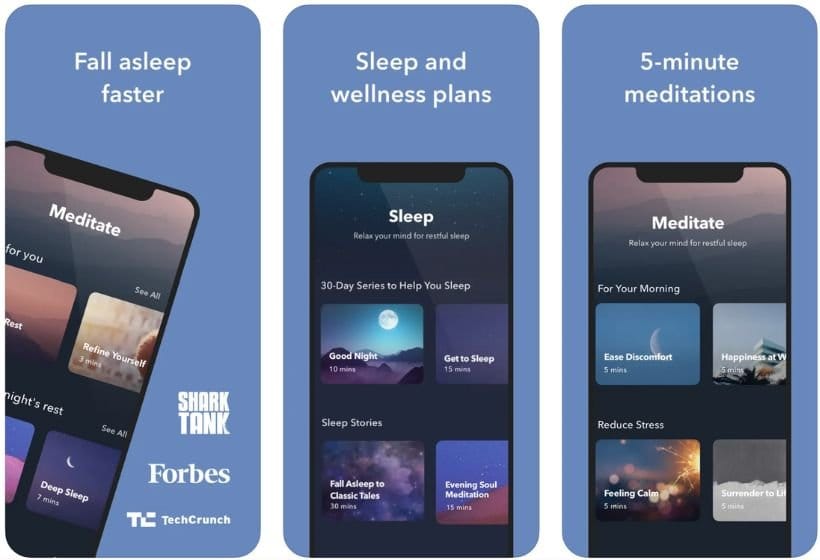
Pros:
- Super short sessions for busy days
- Wide range of topics
- Easy to use anywhere
- Helps build a daily habit
Cons:
- Limited free content
- Needs subscription for most features
Get it from: App Store | Google Play | Website
You and I both know life doesn’t always give us 30 minutes to sit cross-legged on a cushion with our eyes closed.
Sometimes you barely have five. That’s where Simple Habit shines.
This app is for real life. The messy, rushed, “I need to calm down before my next meeting” kind of life.
I like that you can just open it and find a 5-minute session that actually helps.
You don’t have to plan it or overthink it. Just tap, listen, breathe. Done.
You can use it during your lunch break, waiting in the car, even right before bed if that’s all you have.
And they have so many topics—stress, focus, anxiety, sleep, even mindfulness for relationships.
Honestly… If you’ve ever told yourself, “I don’t have time to meditate,” this app is like, “Okay. But you do have five minutes.”
And that five minutes can change your whole day.
If you’re someone who wants meditation that actually fits into a busy schedule, you might really love this one.
7. Smiling Mind – Best Free Option for Kids and Schools
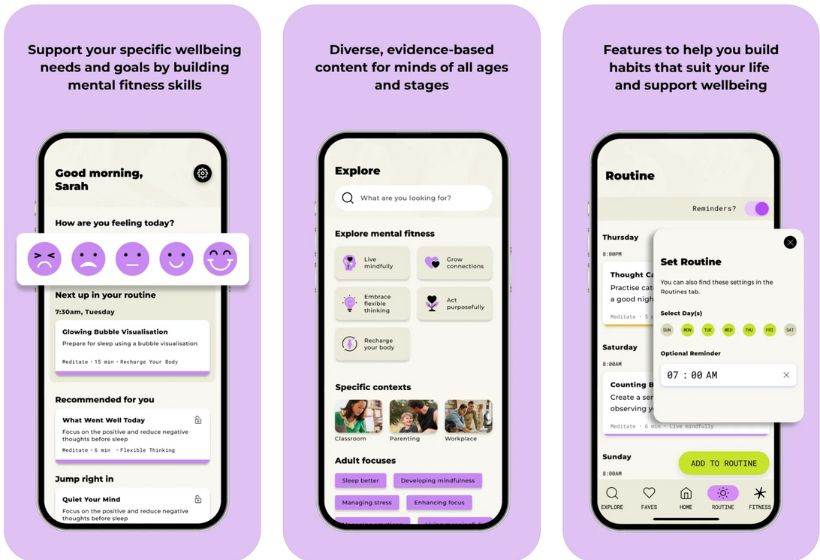
Pros:
- Completely free to use
- Kid-friendly programs
- Great for schools and families
- Simple, no-pressure design
Cons:
- Less polished than big-name apps
- Not as many advanced features
Get it from: App Store | Google Play | Website
You know, not everyone wants to pay for a fancy meditation app. And honestly… That’s totally okay.
Smiling Mind is kind of the good-hearted option on this list. It’s free. Fully free. Made by a non-profit that genuinely wants everyone—especially kids—to have access to mindfulness.
If you’ve got kids (or nieces, nephews, students), this is such a gentle way to help them slow down and breathe.
The meditations are simple and friendly. No weird jargon. Just clear, kind guidance they can actually understand.
But it’s not just for kids.
Even adults can use it to slow down and check in. No paywalls jumping out at you. No upsells. Just open the app and pick what you need.
Honestly… I respect that.
Sometimes you just want help without being sold anything. Smiling Mind is that quiet friend who says, “Hey. It’s okay. Let’s just breathe for a minute.”
8. Aura – Best for Mood-Based Personalized Meditations
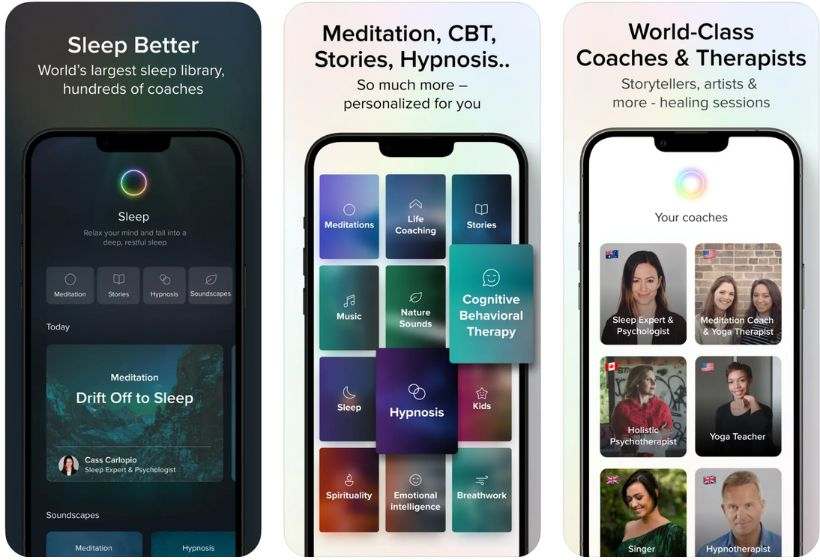
Pros:
- Adapts to your mood each time you use it
- Short meditations that fit busy schedules
- Includes journaling and gratitude prompts
- Variety of teachers and voices
Cons:
- Most content behind subscription
- Interface can feel cluttered with choices
Get it from: App Store | Google Play | Website
You know, Aura is one of those apps that really tries to meet you where you are.
It’s designed to check in on how you feel before giving you anything.
That’s honestly one thing I think they got right—it feels less generic because you’re actually telling it, “I’m stressed,” “I can’t sleep,” or “I’m okay but want to focus.”
And it’s not just guided meditations. They’ve added sleep stories, calming music, and even gratitude journaling, so you can make it more of an all-in-one mindfulness routine if you want.
What I noticed reading reviews—and I felt this too—is that it can be overwhelming at first.
There’s a lot in there. Different teachers, moods, styles. Some people love the variety; others feel like it’s too much to sort through.
Another thing… While they give you a taste for free, most of the good stuff is behind the paywall. That’s a common theme with these apps, but worth knowing upfront.
If you’re someone who likes checking in daily and wants an app to adapt based on your mood—and you don’t mind paying for premium—it’s honestly a pretty strong option.
I see why a lot of people keep it on their phone even if it’s not their main app.
9. Balance – Best for Daily Adaptive Meditation Plans
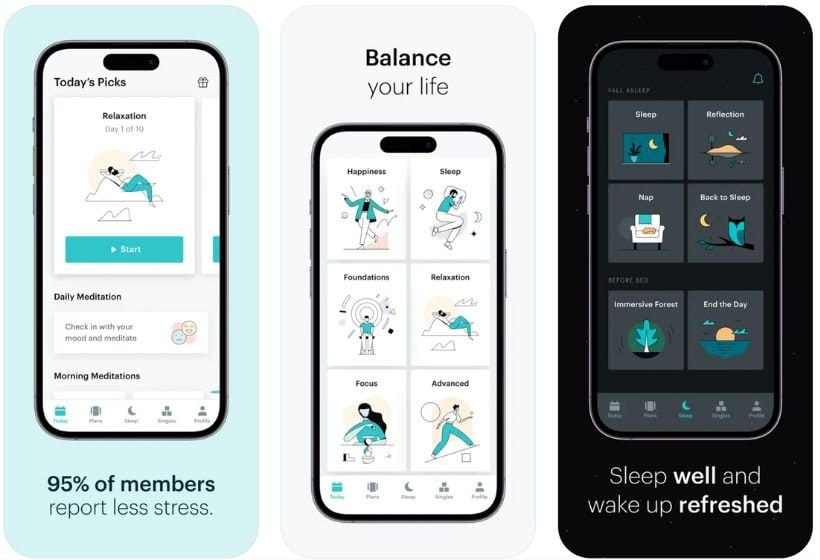
Pros:
- Customizes daily meditation just for you
- Really good for building a daily habit
- Clear, simple design
- Free first year (often offered in promos)
Cons:
- Needs consistent use to get the most out of it
- Premium after trial can be pricey
Get it from: App Store | Google Play | Website
What stands out about Balance is how personal it tries to be. This isn’t one of those apps that throws a library at you and says, “Good luck.”
Instead, it literally builds your daily meditation for you.
Every time you open it, you get a short check-in. It asks about your mood, your goals, even how much time you have.
Based on that, it puts together a guided session that actually makes sense for today.
Reading user reviews, people really appreciate this adaptive approach.
It’s less overwhelming, especially if you’re new or just want someone to tell you what to do. You don’t have to pick a course or dig through endless categories. You just… show up.
I also like that they often offer the first year free. It’s a smart move—they’re basically betting you’ll love it enough to keep going.
But yeah, once the promo is over, it’s a subscription like the others.
What I’d say is this: if you’re serious about making meditation a daily habit but don’t want to plan it all yourself, Balance does a great job of taking that work off your plate.
It’s a really user-friendly way to stay consistent without overthinking it.
10. FitMind – Best for Neuroscience-Backed Mental Training
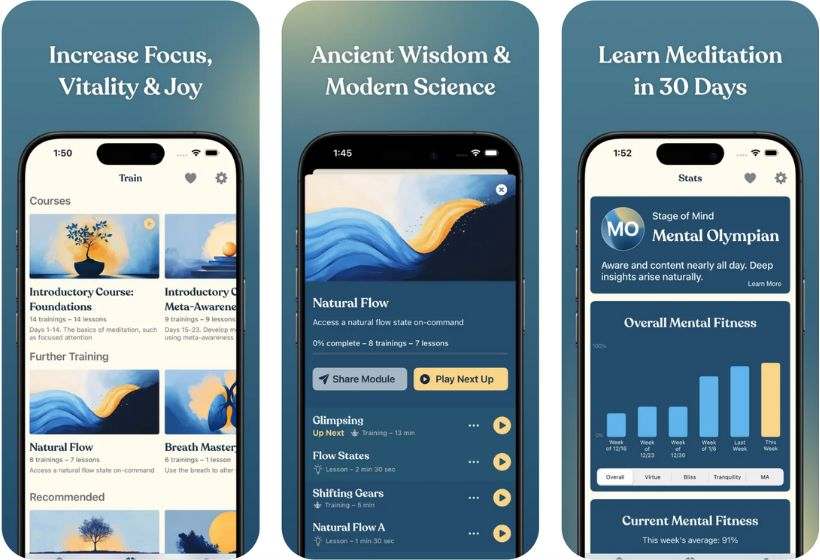
Pros:
- Structured 30-day training program
- Explains the science behind techniques
- Great for people who want more depth
- Highly rated for quality and instruction
Cons:
- Less casual, more “training” focused
- Smaller library than big apps
Get it from: App Store | Google Play | Website
FitMind is different from a lot of these other apps, and honestly, that’s what I like about it.
It doesn’t just give you a bunch of random meditations to pick from—it teaches you.
When I tried it, the first thing I noticed is how structured it is.
They have a 30-day program that’s designed to actually train your mind, step by step. Each session builds on the last. And they don’t just tell you what to do—they tell you why it works, digging into the neuroscience and traditions behind the techniques.
Reading reviews, you see a theme: people love that it doesn’t talk down to them. It’s designed for people who want to really understand meditation, not just use it for a quick fix.
But because of that, it’s less about casual “pop in for 5 minutes” sessions and more about actually committing to the training.
One thing to know—it’s not as big a library as Calm or Insight Timer.
It’s focused. But that focus is its strength if you’re the kind of person who likes having a clear path and knowing there’s science to back it up.
If you’re serious about going beyond “just relaxing” and want to really train your mind, FitMind is one of the most thoughtful apps out there.
My Final Take
Look—I know there are so many meditation apps out there. It can feel like a giant wall of options, all claiming they’ll change your life.
But honestly… It doesn’t have to be complicated.
All you really need is the right fit for you.
That might be something super structured like FitMind if you want to understand the science and go deep. Or maybe it’s Balance, which basically holds your hand and tells you exactly what to do every day.
The best meditation app is the one you’ll actually use.
My hope with this list is that you found at least one that made you think, “Yeah, that sounds like me.”
So don’t overthink it. Try one. Test it out for a few days. See how you feel.
Worst case? You switch to another. Best case? You finally get a few moments of real calm in a world that rarely gives it to you.
If you’ve used any of these, or if you have your own favorite, drop it in the comments. I’d genuinely love to hear what’s worked for you.
Take care of yourself. You deserve it.
FAQs – Best Meditation Apps
What is the best meditation app to calm your mind?
The best meditation app to calm your mind depends on what you need. Apps with short guided sessions, breathing exercises, and calming voices work best for daily stress. Beginners usually benefit from apps that offer simple, structured meditations rather than long or advanced sessions.
Do meditation apps really work for stress and anxiety?
Yes, meditation apps can help reduce stress and anxiety when used regularly. Guided breathing, mindfulness exercises, and body scans help calm the nervous system. Most people notice better results when they use a meditation app daily, even for just a few minutes.
Which meditation app is best for beginners?
Meditation apps designed for beginners usually include short sessions, clear instructions, and basic mindfulness techniques. Look for apps that guide you step by step and don’t assume any prior meditation experience. Simple daily plans work better than long, advanced programs.
Are meditation apps free or do they require a subscription?
Many meditation apps offer free versions with limited sessions. Most advanced features, such as full courses, sleep meditations, and offline access, usually require a subscription. Free versions are often enough to test the app before upgrading.
Can meditation apps help with sleep and overthinking?
Yes, many meditation apps include sleep-focused features like calming music, bedtime stories, and guided wind-down sessions. These tools help slow racing thoughts and relax the body, making it easier to fall asleep and stay asleep.
How long should you meditate each day using an app?
Most meditation apps recommend 5 to 10 minutes per day for beginners. Short, consistent sessions are more effective than long, irregular ones. As you get comfortable, you can increase the duration based on your routine and stress levels.
What features should you look for in a good meditation app?
A good meditation app should include guided sessions, breathing exercises, customizable reminders, and offline access. Sleep meditations and progress tracking are also useful. A clean interface and easy navigation make it easier to stay consistent.

